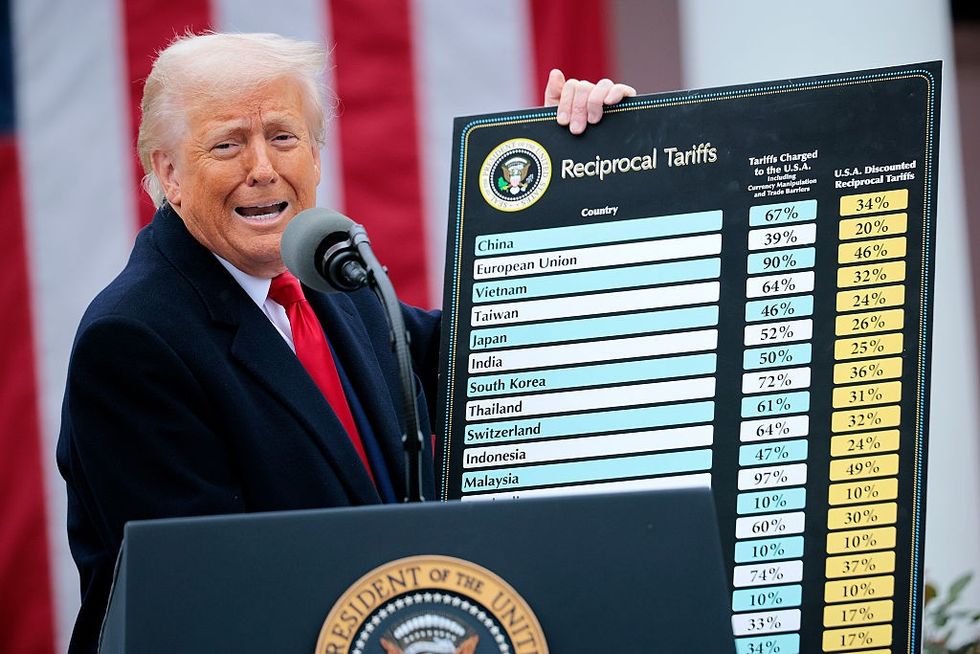Sebastian Gorka says Britons 'don't have much to worry about' with Trump tariffs
GBNEWS
As global markets wobble, Britons are urged to review finances and lock in deals
Don't Miss
Most Read
Trending on GB News
The latest round of US tariffs is shaking up global markets — and it could have a direct impact on your mortgage payments, pension pot and savings returns.
While the measures directly target China, the ripple effects could impact millions of UK households.
While the President has paused higher duties on most imports for 90 days, the UK will still face a 10 per cent levy on goods sold to the US, denting export competitiveness and fuelling economic uncertainty.
Despite better-than-expected UK GDP growth of 0.5 per cent in February, experts warn the economy remains fragile and exposed to global turbulence.
Marcus Brookes, Chief Investment Officer at Quilter Investors said: "President Trump may have ‘paused’ the reciprocal tariffs on other countries, but the new regime remains unchanged for the UK.
"This global economic uncertainty is going to do very little for consumer or business confidence, and growth will continue to be lacklustre."

Trump's 'reciprocal tariffs' graph
GETTY
According to Ian Futcher, financial planner at Quilter, the global economic uncertainty triggered by tariffs could lead the Bank of England to cut interest rates in a bid to stimulate growth, which in turn could affect many other areas of one's finances.
Mortgages: act early and review your deal
The shift in market expectations has already begun to feed through to UK swap rates — the mechanism used by lenders to price fixed-rate mortgages.
As swap rates drop, some lenders have already begun cutting mortgage rates, and more may follow if conditions persist.
Futcher said: "Homeowners with variable or tracker deals could benefit further should the Bank of England act.
"Ideally, borrowers should have their paperwork in order at least six months before their current deal ends.
"That allows them to move quickly and secure a competitive rate as they approach the end of their term.
"With mortgage pricing often fluctuating in response to economic news, being ready to act early can make a significant difference to monthly repayments.”

Lower interest rates may help borrowers
GETTYSavings: secure better rates while they last
Lower interest rates may help borrowers, but they usually lead to falling savings returns, particularly in easy-access accounts.
Futcher explained that tariff-driven inflation could further weaken the real returns savers receive.
He urged savers to take action now while top deals are still available and said: "Savers should be proactive—locking into fixed-term deals where higher rates still exist or considering a diversified investment strategy tailored to their time horizon and risk appetite."
Pensions and annuities: prepare for volatility
Pension pots, which are often heavily invested in equities and bonds, remain vulnerable to global market swings.
Futcher noted tha those nearing retirement may see their pension values fluctuate more than expected and should consider whether their portfolios reflect an appropriate level of risk.
Annuity rates, tied closely to long-term gilt yields, could also face downward pressure.
Futcher added: "For those considering converting pension savings into a guaranteed income, timing will be key."

As swap rates drop, some lenders have already begun cutting mortgage rates,
GETTYInvestments: don’t panic, stay diversified
Global equity markets have reacted strongly to tariff news, with sharp movements highlighting the impact of geopolitical events on investor sentiment.
Futcher added: "While it’s encouraging to see signs of diplomatic flexibility, the persistence of elevated tariffs on Chinese goods still poses risks to corporate profits and broader economic stability."
He warns against trying to time the market stating that knee-jerk reactions rarely serve long-term goals.
He said: "If anything, this period demonstrates why remaining invested and staying the course can often yield better outcomes."
As the global economy faces renewed pressure, UK households are being urged to take stock of their finances.
From mortgage decisions to retirement planning, the message is clear: uncertainty is here to stay — but preparation can make all the difference.
Taking time now to strengthen your financial position, lock in stable returns, and avoid knee-jerk reactions could help weather whatever comes next.
Futcher concluded: "While governments set trade policy, it's individuals who often absorb the shock. The best approach is to stay informed, stay flexible, and stay focused."







